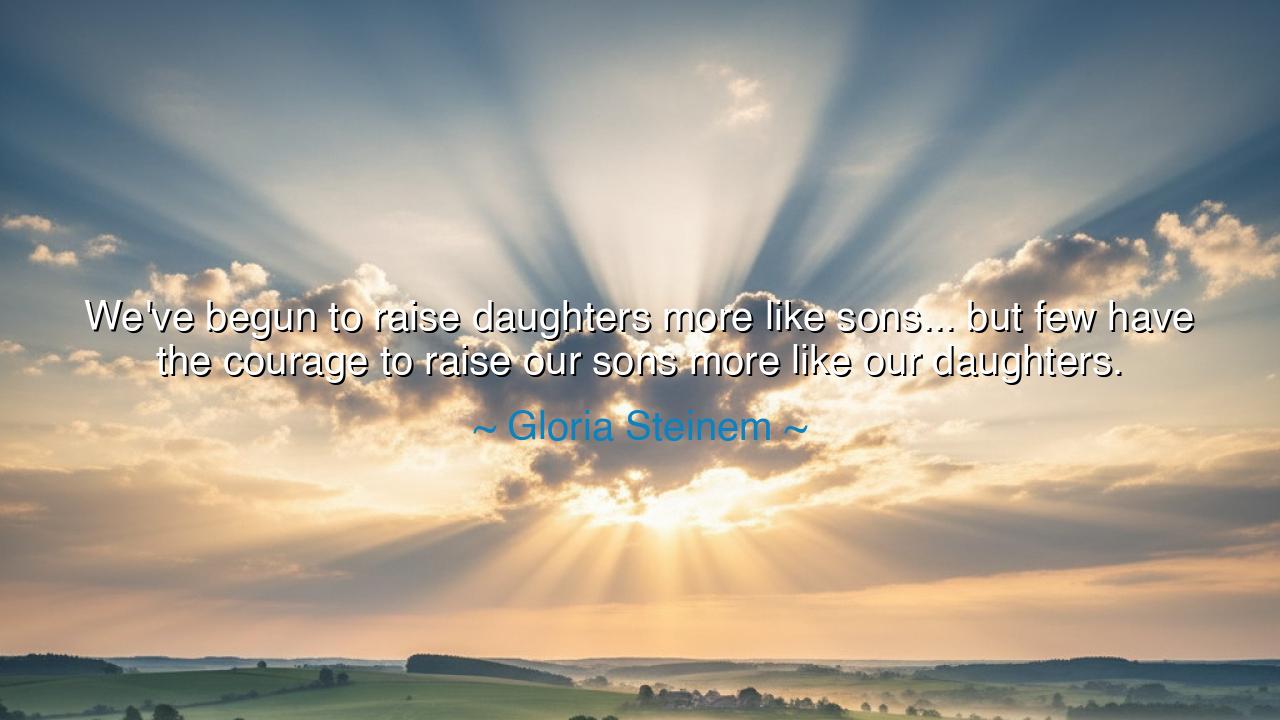
We've begun to raise daughters more like sons... but few have the
We've begun to raise daughters more like sons... but few have the courage to raise our sons more like our daughters.






The words of Gloria Steinem — “We’ve begun to raise daughters more like sons… but few have the courage to raise our sons more like our daughters.” — cut through the fabric of modern civilization like a blade of truth, glinting with both triumph and challenge. In this single sentence, the great feminist thinker and activist reveals the unfinished nature of human liberation. Steinem celebrates the progress that has allowed women to rise, to dream, to act with the freedom once reserved only for men — yet she laments that men themselves remain imprisoned by the same old walls of expectation. The quote is both a celebration of progress and a call to revolution — a call to heal not just one half of humanity, but both.
Steinem spoke from the heart of the 20th-century feminist movement, a time when women across the world were casting off the chains of silence and subservience, claiming their right to education, autonomy, and ambition. She witnessed the long, arduous transformation of societies that had, for centuries, taught girls to be obedient and boys to be dominant. Through the power of voices like hers, the world began to raise daughters more like sons — teaching them to be strong, assertive, and self-reliant. Yet, she saw another imbalance arise: while women were encouraged to claim the qualities of confidence and independence, men were still discouraged from embracing vulnerability, empathy, and tenderness — qualities long labeled as feminine but truly universal.
In her wisdom, Steinem recognized that true equality cannot come from making women more like men, but from freeing both genders from the narrow prisons of their assigned roles. The quote’s second half — “but few have the courage to raise our sons more like our daughters” — reveals the deeper truth: it is not only women who have suffered under patriarchy, but men too. Boys are taught from an early age to suppress emotion, to hide tears, to prove their worth through conquest rather than compassion. This training, disguised as strength, wounds the soul and separates men from their own humanity. Courage, she says, is required not only to empower women, but to soften men — to allow them to love freely, to care deeply, to feel without shame.
History offers echoes of this wisdom in the lives of those who dared to challenge these ancient roles. Consider Mahatma Gandhi, who showed the world that strength and gentleness are not opposites but companions. He led a revolution not through violence, but through compassion and moral force. He wept openly for his people and stood unflinchingly for truth. In him, we see what it means to raise a son “like a daughter” — to nurture empathy as the highest form of power. And in contrast, think of the generations of men trained for war, taught that their worth lay in dominance, not in peace. They became warriors but forgot how to be whole.
Steinem’s insight is not a condemnation of men, but a plea for their liberation. To raise sons like daughters is not to weaken them, but to make them fully human — to allow them the freedom to express tenderness without fear, to pursue harmony instead of conquest. It is to teach them that courage lies not only in battle but in honesty, in love, in vulnerability. For the world has long suffered from an excess of pride and a deficit of compassion. To heal this imbalance, humanity must learn to weave both strength and sensitivity into every child’s soul, regardless of gender.
There is also a spiritual echo in Steinem’s words — the ancient harmony between the masculine and feminine that has been lost through centuries of division. In every human being lies both the fire of action and the water of empathy. To raise daughters only in fire is to deny them rest; to raise sons only in iron is to deny them softness. True balance, true happiness, comes when both forces dwell in unity — when the warrior learns peace, and the nurturer learns courage. The ancients knew this: the Taoists called it the dance of yin and yang, the harmony of opposites that sustains all creation.
Let this teaching, then, be passed to those who guide the next generation. Raise your daughters to be brave, but also kind. Raise your sons to be strong, but also gentle. Teach them that emotion is not weakness, that compassion is not surrender, that equality is not sameness but wholeness. Let no child grow believing that love belongs to one gender and power to another. For when both men and women are free to embody the full range of human virtue, the world itself will heal — its wars will lessen, its wounds will close, and the human heart will remember its completeness.
And so, remember the wisdom of Gloria Steinem: “We’ve begun to raise daughters more like sons… but few have the courage to raise our sons more like our daughters.” Let that courage be yours. Let it live in your home, your teaching, your example. For when we raise children not by the old divisions, but by the truth of their shared humanity, we bring the dawn of a new world — one where love and strength walk hand in hand, and happiness belongs to all.






AAdministratorAdministrator
Welcome, honored guests. Please leave a comment, we will respond soon